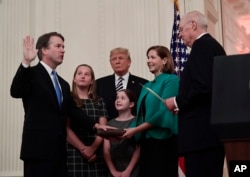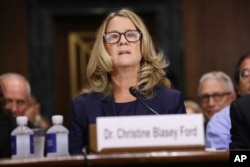U.S. President Donald Trump, basking in the Senate confirmation of Brett Kavanaugh to the Supreme Court, on Monday staged a ceremonial swearing-in for him at the White House.
“I want to apologize to Brett and the entire Kavanaugh family for the pain and suffering you were forced to endure,” Trump said when introducing Kavanaugh. “Under historic scrutiny you were proven innocent," he added, referring to an FBI investigation of allegations of sexual misconduct made against Kavanaugh. The FBI did not conduct a criminal investigation, however.
After taking a ceremonial oath, Kavanaugh said, “Mr. President, thank you for everything."
He said he has “no bitterness” about his contentious confirmation process and promises he’ll be independent “and interpret the law, not make the law.”
Kavanaugh was officially sworn in hours after the Senate narrowly confirmed him Saturday to a lifetime seat on the country's highest court. But Trump and Republicans are also hoping the confirmation of the 53-year-old Kavanaugh, a conservative jurist, will energize Republican voters in next month's nationwide congressional elections when political control of Congress is at stake.
When he ran for the presidency in 2016, Trump vowed to appoint conservative judges to the Supreme Court, disclosing a list of possible candidates.
With Kavanaugh's ascent to the nine-member high court, Trump now has filled two vacancies on the court from his list, including Neil Gorsuch last year.
Senate Republican leader Mitch McConnell, who led the fight for Kavanaugh's confirmation and for other conservative judges to lower courts, called the effort "the most important thing that the Senate and an administration of like mind ... could do for the country.”
“Putting strict constructionists, relatively young, on the courts for lifetime appointments is the best way to have a long-term positive impact on America," McConnell said, "And today is a seminal moment in that effort.”
Kavanaugh won confirmation on a 50-48 vote on nearly a party-line vote, with almost all Republicans supporting him and all but one Democrat opposing him. His nomination was thrown into turmoil in the three weeks preceding the vote after university professor Christine Blasey Ford accused Kavanaugh of sexually assaulting her at a suburban Washington house party more than three decades ago when both were teenagers.
Senator Susan Collins, the Maine Republican whose support for Kavanaugh was key to him winning Senate approval, told CNN on Sunday that she concluded that Kavanaugh did not carry out the attack even though she believes Ford was assaulted.
"I do not believe Brett Kavanaugh was her assailant," Collins said.
"I'm not saying she was not assaulted," the lawmaker said. "I believe she was assaulted by someone."
But Collins contended there "was no corroborating evidence" that it was Kavanaugh, a claim that drew a sharp rebuke from Hawaii Senator Mazie Hirono, a Democratic opponent of Kavanaugh, who called Collins's conclusion about lack of corroborating evidence "insulting" to Ford.
Contemporaries of Ford and Kavanaugh whom Ford alleged were at the 1982 party where she says the attack occurred said they had no recollection of the incident.
Ford told lawmakers two weeks ago she was "100 percent" certain it was Kavanaugh who had attacked her, while Kavanaugh said he was equally certain he had never attacked Ford or any other woman.
One of Kavanaugh's most vocal supporters, Senator Lindsey Graham of South Carolina, told Fox News, "I’m happy because the effort to railroad and humiliate this man failed ... Those who tried to destroy his life fell short ... I had never been more [angry] in my life."
Kavanaugh, now the country's 114th Supreme Court justice, could give conservatives a solid 5-4 ideological edge on the court and shape rulings for decades.
He is replacing retired Justice Anthony Kennedy, a conservative jurist who often cast the deciding swing vote on ideologically divisive issues, upholding abortion and gay rights and the use of affirmative action aiding racial minorities in college admissions. But independent court analysts say Kavanaugh is likely to lean toward more conservative rulings.








